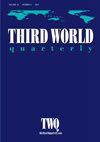European foreign aid to regional organisations in Africa: bullies, overseers, micromanagers and samaritans
IF 1.8
2区 经济学
Q2 DEVELOPMENT STUDIES
引用次数: 0
Abstract
Abstract How do external actors promote regional international organisations (RIOs) through their regional foreign aid? Whereas most leading theories of regionalism stipulate that RIOs are designed and shaped by intra-regional actors from ‘within’, this study develops a novel framework for exploring donor involvement in RIOs during various stages of the foreign aid policy cycle. The research design is based on a comparison of the four largest European donors of regional foreign aid (EU, Germany, Sweden and the UK) towards the largest recipient in Africa (African Union). The comparative analysis reveals considerable variation and each donor employ their own distinct approach, which we conceptualise as Bully (EU), Overseer (UK), Micromanager (Germany) and Samaritan (Sweden). This comparative design enables us not only to escape the EU-centrism that currently distorts the research field but also to analyse the different ways by which European donors try to influence and even control RIOs in Africa through their foreign aid. The deep donor involvement in RIOs in Africa challenges us to rethink external intrusion, the meaning of ownership as well as conventional boundaries of ‘inside’/’outside’ in the study of regionalism.欧洲对非洲地区组织的外援:恃强凌弱者、监督者、微观管理者和撒玛利亚人
摘要外部行动者如何通过其区域对外援助促进区域国际组织?尽管大多数领先的区域主义理论都规定,RIO是由“内部”的区域内行为者设计和塑造的,但本研究为探索捐助者在对外援助政策周期的各个阶段参与RIO提供了一个新的框架。该研究设计基于欧洲四大区域对外援助捐助方(欧盟、德国、瑞典和英国)与非洲最大受援国(非洲联盟)的比较。比较分析揭示了相当大的差异,每个捐助者都采用了自己独特的方法,我们将其概念化为Bully(欧盟)、Oversear(英国)、Micromanager(德国)和Samaritan(瑞典)。这种比较设计不仅使我们能够摆脱目前扭曲研究领域的欧盟中心主义,还使我们能够分析欧洲捐助者试图通过其对外援助影响甚至控制非洲RIO的不同方式。捐助者对非洲RIO的深入参与使我们在区域主义研究中重新思考外部入侵、所有权的含义以及“内部”/“外部”的传统界限。
本文章由计算机程序翻译,如有差异,请以英文原文为准。
求助全文
约1分钟内获得全文
求助全文
来源期刊

Third World Quarterly
DEVELOPMENT STUDIES-
CiteScore
4.10
自引率
15.00%
发文量
137
期刊介绍:
Third World Quarterly ( TWQ ) is the leading journal of scholarship and policy in the field of international studies. For almost four decades it has set the agenda of the global debate on development discourses. As the most influential academic journal covering the emerging worlds, TWQ is at the forefront of analysis and commentary on fundamental issues of global concern. TWQ examines all the issues that affect the many Third Worlds and is not averse to publishing provocative and exploratory articles, especially if they have the merit of opening up emerging areas of research that have not been given sufficient attention. TWQ is a peer-reviewed journal that looks beyond strict "development studies", providing an alternative and over-arching reflective analysis of micro-economic and grassroot efforts of development practitioners and planners. It furnishes expert insight into crucial issues before they impinge upon global media attention. TWQ acts as an almanac linking the academic terrains of the various contemporary area studies - African, Asian, Latin American and Middle Eastern - in an interdisciplinary manner with the publication of informative, innovative and investigative articles. Contributions are rigorously assessed by regional experts.
 求助内容:
求助内容: 应助结果提醒方式:
应助结果提醒方式:


